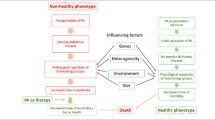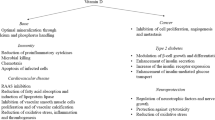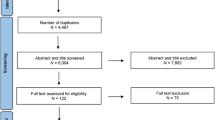Abstract
Background
The impact of supplementation with selenium and coenzyme Q10 (CoQ10) on health-care usage and health-related quality of life (Hr-QoL) in community-dwelling elderly people has, to our knowledge, not previously been investigated.
Aim
To investigate the effect of 48 months supplementation with CoQ10 and selenium on community-dwelling elderly as regards: (I) the number of days out of hospital, and (II) the effect on Hr-QoL.
Methods
A 48-month double-blind randomized placebo-controlled trial was carried out. A total of 443 participants were given CoQ10 and organic selenium yeast combined, or a placebo. All admissions to the Department of Internal Medicine or Cardiology were evaluated. Hr-QoL were measured with the Short Form-36 (SF-36), the Cardiac Health Profile (CHP) and one item overall-quality of life (overall-QoL).
Results
A total of 206 participants were evaluated after 48 months. No changes were found in the number of days out of hospital or Hr-QoL. A sub-analysis of participants matched for age, gender and baseline cardiac wall tension as measured by NT-proBNP was performed. The mean number of days out of hospital was 1779 for those taking the active substance compared to 1533 for those taking the placebo (p=0.03). Those with active substance declined significantly less in the HR-QoL domains of physical role performance (p=0.001), vitality (p=0.001), physical component score (p=0.001), overall QoL (p=0.001), somatic dimension (p=0.001), conative dimension (p=0.001) and global function (p=0.001).
Conclusion
In a match-group analysis selenium and CoQ10 increased the number of days out of hospital and slowed the deterioration in Hr-QoL.
Similar content being viewed by others
References
Morris G, Anderson G, Berk M, Maes M. Coenzyme Q10 Depletion in Medical and Neuropsychiatric Disorders: Potential Repercussions and Therapeutic Implications. Mol Neurobiol. 2013;48(3):883–903.
Kalen A, Norling B, Appelkvist EL, Dallner G. Ubiquinone biosynthesis by the microsomal fraction from rat liver. Biochim Biophys Acta. 1987;926(1):70–8.
Littarru GP, Tiano L. Clinical aspects of coenzyme Q10: an update. Nutrition. 2010;26(3):250–4.
Senes M, Erbay AR, Yilmaz FM, Topkaya BC, Zengi O, Dogan M, et al. Coenzyme Q10 and high-sensitivity C-reactive protein in ischemic and idiopathic dilated cardiomyopathy. Clin Chem Lab Med. 2008;46(3):382–6.
Kaikkonen J, Nyyssonen K, Tuomainen TP, Ristonmaa U, Salonen JT. Determinants of plasma coenzyme Q10 in humans. FEBS Lett. 1999;443(2):163–6.
Fairweather-Tait SJ, Bao Y, Broadley MR, Collings R, Ford D, Hesketh JE, et al. Selenium in human health and disease. Antioxid Redox Signal. 2011;14(7):1337–83.
Rayman MP. Selenium and human health. Lancet. 2012;379(9822):1256–68.
Xia L, Nordman T, Olsson JM, Damdimopoulos A, Bjorkhem-Bergman L, Nalvarte I, et al. The mammalian cytosolic selenoenzyme thioredoxin reductase reduces ubiquinone. A novel mechanism for defense against oxidative stress. J Biol Chem. 2003;278(4):2141–6.
Le Bouil A, Briand P, Allain P, Dupuis JM, Geslin P, Tadei A. Plasma selenium in congestive heart failure. Clin Chem. 1992;38(6):1192–3.
Jekell A, Hossain A, Alehagen U, Dahlstrom U, Rosen A. Elevated circulating levels of thioredoxin and stress in chronic heart failure. Eur J Heart Fail. 2004;6(7):883–90.
Tseng CK, Ho CT, Hsu HS, Lin CH, Li CI, Li TC, et al. Selenium is inversely associated with interleukin-6 in the elderly. The Journal of nutrition, health & aging. 2013;17(3):280–4.
Alehagen U, Johansson P, Bjornstedt M, Rosen A, Dahlstrom U. Cardiovascular mortality and N-terminal-proBNP reduced after combined selenium and coenzyme Q10 supplementation: A 5-year prospective randomized double-blind placebo-controlled trial among elderly Swedish citizens. Int J Cardiol. 2103;167(5):1860–6.
Johansson P, Dahlstrom O, Dahlstrom U, Alehagen U. Effect of selenium and Q10 on the cardiac biomarker NT-proBNP. Scand Cardiovasc J. 2013;47(5):281–8.
Holmes CA. Health care and the quality of life: a review. J Adv Nurs. 1989;14(10):833–9.
Rumsfeld JS, Alexander KP, Goff DC, Jr., Graham MM, Ho PM, Masoudi FA, et al. Cardiovascular health: the importance of measuring patient-reported health status: a scientific statement from the American Heart Association. Circulation. 2013;127(22):2233–49.
Anker SD, Agewall S, Borggrefe M, Calvert M, Jaime Caro J, Cowie MR, et al. The importance of patient-reported outcomes: a call for their comprehensive integration in cardiovascular clinical trials. Eur Heart J. 2014;35(30):2001–9.
Cordero MD, Alcocer-Gomez E, de Miguel M, Culic O, Carrion AM, Alvarez-Suarez JM, et al. Can Coenzyme Q Improve Clinical and Molecular Parameters in Fibromyalgia? Antioxid Redox Signal. 2013;19(12):1356–61.
Sander S, Coleman CI, Patel AA, Kluger J, White CM. The impact of coenzyme Q10 on systolic function in patients with chronic heart failure. J Card Fail. 2006;12(6):464–72.
Fotino AD, Thompson-Paul AM, Bazzano LA. Effect of coenzyme Q(1)(0) supplementation on heart failure: a meta-analysis. Am J Clin Nutr. 2013;97(2):268–75.
Alehagen U, Lindstedt G, Eriksson H, Dahlstrom U. Utility of the amino-terminal fragment of pro-brain natriuretic peptide in plasma for the evaluation of cardiac dysfunction in elderly patients in primary health care. Clin Chem. 2003;49(8):1337–46.
Dickstein K, Cohen-Solal A, Filippatos G, McMurray JJV, Ponikowski P, Poole-Wilson PA, et al. ESC Guidelines for the diagnosis and treatment of acute and chronic heart failure 2008: The Task Force for the Diagnosis and Treatment of Acute and Chronic Heart Failure 2008 of the European Society of Cardiology. Developed in collaboration with the Heart Failure Association of the ESC (HFA) and endorsed by the European Society of Intensive Care Medicine (ESICM). European Journal of Heart Failure. 2008;10(10):933–89.
Sullivan M, Karlsson J, Ware JE, Jr. The Swedish SF-36 Health Survey—I. Evaluation of data quality, scaling assumptions, reliability and construct validity across general populations in Sweden. Soc Sci Med. 1995;41(10):1349–58.
Ware JE, Jr., Sherbourne CD. The MOS 36-item short-form health survey (SF-36). I. Conceptual framework and item selection. Med Care. 1992;30(6):473–83.
Ware JE, Jr. SF-36 health survey update. Spine. 2000;25(24):3130–9.
Wahrborg P, Emanuelsson H. The cardiac health profile: content, reliability and validity of a new disease-specific quality of life questionnaire. Coron Artery Dis. 1996;7(11):823–9.
Mannheimer B, Andersson B, Carlsson L, Wahrborg P. The validation of a new quality of life questionnaire for patients with congestive heart failure-an extension of the Cardiac Health Profile. Scand Cardiovasc J. 2007;41(4):235–41.
Bengtsson I, Hagman M, Währborg P, Wedel H. Lasting impact on health-related quality of life after a first myocardial infarction. International Journal of Cardiology. 2004;97(3):509–16.
Gill TM, Feinstein AR. A critical appraisal of the quality of quality-of-life measurements. JAMA. 1994;272(8):619–26.
Lainscak M, Farkas J, Frantal S, Singer P, Bauer P, Hiesmayr M, et al. Self-rated health, nutritional intake and mortality in adult hospitalized patients. European journal of clinical investigation. 2014;44(9):813–24.
Saarni SI, Suvisaari J, Sintonen H, Koskinen S, Harkanen T, Lonnqvist J. The health-related quality-of-life impact of chronic conditions varied with age in general population. J Clin Epidemiol. 2007;60(12):1288–97.
Singer MA, Hopman WM, MacKenzie TA. Physical functioning and mental health in patients with chronic medical conditions. Qual Life Res. 1999;8(8):687–91.
Jimenez-Redondo S, Beltran de Miguel B, Gavidia Banegas J, Guzman Mercedes L, Gomez-Pavon J, Cuadrado Vives C. Influence of nutritional status on health-related quality of life of non-institutionalized older people. The journal of nutrition, health & aging. 2014;18(4):359–64.
Skough K, Krossen C, Heiwe S, Theorell H, Borg K. Effects of resistance training in combination with coenzyme Q10 supplementation in patients with post-polio: a pilot study. J Rehabil Med. 2008;40(9):773–5.
Mortensen SA, Rosenfeldt F, Kumar A, Dolliner P, Filipiak KJ, Pella D, et al. The Effect of Coenzyme Q on Morbidity and Mortality in Chronic Heart Failure: Results From Q-SYMBIO: A Randomized Double-Blind Trial. JACC Heart failure. 2014.
Witte KK, Nikitin NP, Parker AC, von Haehling S, Volk HD, Anker SD, et al. The effect of micronutrient supplementation on quality-of-life and left ventricular function in elderly patients with chronic heart failure. Eur Heart J. 2005;26(21):2238–44.
Alcocer-Gomez E, Cano-Garcia FJ, Cordero MD. Effect of coenzyme Q10 evaluated by 1990 and 2010 ACR Diagnostic Criteria for Fibromyalgia and SCL-90-R: four case reports and literature review. Nutrition. 2013;29(11–12):1422–5.
Lee J, Hong YS, Jeong JH, Yang EJ, Jhun JY, Park MK, et al. Coenzyme Q10 ameliorates pain and cartilage degradation in a rat model of osteoarthritis by regulating nitric oxide and inflammatory cytokines. PLoS One. 2013;8(7):e69362.
Depp CA, Jeste DV. Definitions and predictors of successful aging: a comprehensive review of larger quantitative studies. Am J Geriatr Psychiatry. 2006;14(1):6–20.
Author information
Authors and Affiliations
Corresponding author
Rights and permissions
About this article
Cite this article
Johansson, P., Dahlström, Ö., Dahlström, U. et al. Improved health-related quality of life, and more days out of hospital with supplementation with selenium and coenzyme Q10 combined. Results from a double blind, placebo-controlled prospective study. J Nutr Health Aging 19, 870–877 (2015). https://doi.org/10.1007/s12603-015-0509-9
Received:
Accepted:
Published:
Issue Date:
DOI: https://doi.org/10.1007/s12603-015-0509-9




